Originally from New Zealand, Brent Stanton now permanently resides in New York City, working in Film & Television, as well as Music. Brent has a wealth of knowledge to share. We wanted to take a walk down memory lane and learn more about Brent’s journey as a working musician in NYC and if he had any advice for our current students.
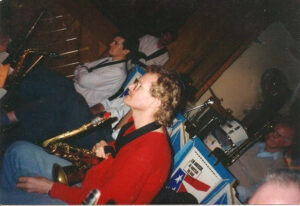
Tell us about the beginning of your musical journey.
When I was 10 in Christchurch, NZ my parents could see I had been interested in music for some time. My parents mysteriously found me a teacher and I started learning clarinet. I only appreciated later that the teacher was Dean Howe, a US musician who had settled in Christchurch NZ.
Later I came to learn that Dean had played with the likes of Jack Teagarden and Benny Goodman. He also toured in the 30s with the Ted Weems Orchestra and saw Basie’s Band with Lester Young in Kansas City before they were ever famous. He had ended up a studio musician in LA, playing for the likes of Bing Crosby and even appearing in a film with Louis Armstrong. I have a pretty vivid memory and I remember Dean talking about Conrad Gozzo being the lead trumpeter on many sessions. He told me about Bing Crosby being the highest paid artist, and how all the studio players scrambled to make sure they would get on the Bing Crosby recording dates. Each year Dean returned to the US, visiting Las Vegas as a guest of Louis Prima whom he’d played for. Dean always talked about swinging, no matter what. I always remember the story of him hanging with a then 17 year old Stan Getz and that Stan had started out playing bassoon, hence the tighter embouchure. He talked about Stan’s photographic memory and about the two of them seeing Art Tatum playing solo piano in a speak easy in Toledo, Ohio when they were touring.
Then in high school, I played in various bands – clarinet then eventually saxophone and even bass guitar! I just played a lot!!!!! We had regular school concerts and tours. What a time! It’s how I managed to come through high school relatively unscathed!
Who else influenced you during those early years of playing?
Apart from Dean, my other biggest influence was Stu Buchanan, who was the itinerant woodwind teacher at high school, and the busiest musician in Christchurch. He was (and would still be if he were alive), the most natural and gifted musician I’ve encountered yet. Stu played any instrument and was a singer also. He is the only person I have known who could whistle harmony – through 2 apertures – and control the interval – parallel 3rds or 4ths!
I once asked Stu how to improvise. He simply said:
“learn the melody really well, and play something else that fits by using your ear”
— which is basically what I still do!
Stu would take me to hear lunchtime concerts with local and visiting bands. He would eventually put me in as a sub on his gigs – and give me his best gigs – he knew I was hungry to learn and he wanted me to play with the best musicians.
After high school I got to play with local big bands, and at 16 I toured New Zealand with visiting variety arts, mostly those from the UK. I was lucky enough to play in a band led by a wonderful local Christchurch jazz saxophone, clarinet and flute player, Ian Edwards. Ian and his partner and drummer Viv spent a lifetime playing gigs. As an older teen, Ian was one of the best on-the-bandstand teachers you could ever have. Every week, I would furiously learn chords and theory, so that I could play harmony to his melody. Ian and Viv introduced me to the music Sonny Rollins, John Coltrane and Duke Ellington and also Cannonball Adderley, whom he’d seen live several times in the early 1970s. Ian could sound like Cannonball, Johnny Hodges or Benny Carter on the alto, and Benny Goodman, Buddy DeFranco, or Jimmy Hamilton on the clarinet. He was always interested in what I was learning.
And to this day, the obsession with it all lives on! I just can’t stop it! Each new day feels like a new beginning.
When did you meet Greg Quigley along this journey, and how did that friendship form?
I met Greg when we were in the same Sydney Con jazz class in 1978. 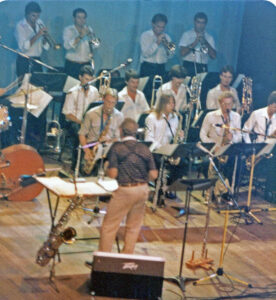 I believe it was about that time he began realising what he thought the Australian Jazz scene might benefit from, and began an entrepreneurial career that is still going just as strong as then. You all know who and what he brought to this part of the world. He has never flagged from that mission! He still wants to develop things! We’ve remained close friends all these years and we check in regularly.
I believe it was about that time he began realising what he thought the Australian Jazz scene might benefit from, and began an entrepreneurial career that is still going just as strong as then. You all know who and what he brought to this part of the world. He has never flagged from that mission! He still wants to develop things! We’ve remained close friends all these years and we check in regularly.
What drew you to the idea of living and working in New York?
I was a lucky recipient of a Don Banks Memorial Scholarship in 1981, which is when I first went there to study. I stayed for 10 months until the scholarship and my savings completely ran out! It’s interesting because as a young kid I had always wondered in the back of my mind if it would ever be a possibility to live and work there. In 1987, I sold my car and returned again, but this time I met my wife Deb, and I’ve been here ever since. I think it took me about 10 years to feel like a New Yorker and here I am, 35 years later!
What’s the jazz scene like in New York?
I will preface the answer with an observation. Living in NYC has always been a challenge. There is a “jazz scene” but in my time here it has always only been for a small select few in amongst many great musicians. I think musicians in Australia get to play jazz more often than those in NY other than the “chosen” ones. To make a decent living playing jazz in NY, most musicians either spend more time out of the city than in it, or like me, living in it and playing many different styles of music.
There have been several new generations of jazz musicians here though since 1998, and it feels just as vital as it always was in terms of talent and energy. Most jazz musicians arrive here being able to play, but they always come to learn — at any level. It’s always humbling!
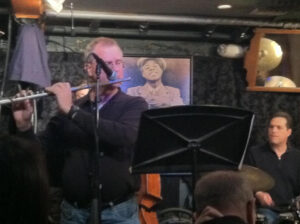
I used to play lots of gigs, every rehearsal band that existed – and that’s where you would make your contacts. If you could play, it’s likely you would begin by subbing for someone else, and then you would eventually become established – big and small bands, trio gigs, weddings and bar mitzvahs, and you would be surprised who showed up on the gig! I was a doubler, so I could also play Broadway pit gigs, horn sections, and in what commercial recording there still was. Most musicians made their living by touring or teaching (then and now). I did some touring but I mostly preferred to stay in and around the city. It was a time when you waited for the phone to ring — and it rang a lot for me. When I sold the saxophone and started to concentrate on being a flute player, the phone stopped ringing and for me it became about creating your own gigs and your own opportunities.
I love the city. It gives me everything I feel I need – most of the time! It’s totally unlike any other city in the US. It changes and grows – it’s literally its own island! It fuels my energy and keeps me young. Even with a full time day job, I have a practice studio I go to every day very early in the mornings, even weekends. I have students, whom I mostly teach online. I don’t perform nearly enough, but I know I will again.
Are there are significant moments/milestones that you remember fondly from your time performing in NYC?
There are so many. How much time do I have? Ha ha!
I have been a professional musician now for 50 years and I’ve taught for about 30 of those.
Many years ago I transcribed enough Paul Gonsalves solos for a book! It started out as a project as part of an amazing Duke Ellington class at Manhattan School with the amazing David Berger who became the book’s editor and proof-reader! I happened to play in a regular rehearsal band and one of the many drummers to play in that band was Steve Little. 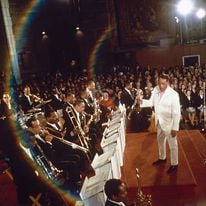 Steve had played with Duke Ellington in 1962 and roomed with Gonsalves on the road (Steve is still playing around the city and sounding great!). So of course, I got some nice personal stories about Paul that fed nicely in to the book’s introduction. During that same time, one night playing at a club on 46th Street, I was somehow introduced to George Avakian who produced the famous 1958 album of Duke at Newport with the famous long Gonsalves solo. I thought to ask George for a quote I could use in the book and he was very gracious! One day I guess I had better publish the book! It’s around somewhere – I think it’s on a hard drive somewhere.
Steve had played with Duke Ellington in 1962 and roomed with Gonsalves on the road (Steve is still playing around the city and sounding great!). So of course, I got some nice personal stories about Paul that fed nicely in to the book’s introduction. During that same time, one night playing at a club on 46th Street, I was somehow introduced to George Avakian who produced the famous 1958 album of Duke at Newport with the famous long Gonsalves solo. I thought to ask George for a quote I could use in the book and he was very gracious! One day I guess I had better publish the book! It’s around somewhere – I think it’s on a hard drive somewhere.
A few years ago, my day job facilitated me being asked to sit with the Harry Connick Band on his daytime TV show and I grabbed that opportunity.
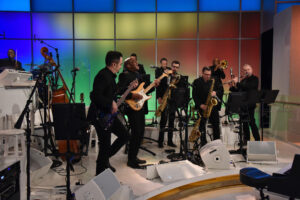
I knew the show’s TV director and when I got to see the line cut, he seemed to make sure there were plenty of shots of Brent! It was also great to get to know Harry a bit, and learn more about him and the way he lives life. Now there’s someone who constantly lives in his genius zone! He’s someone very inspiring and fun to be around. He used to have a segment on the show called Harry Tries. He truly spends his life trying almost everything, even for just a short while. I wonder how many people know that Harry is an expert on pipe organs, has built them from scratch, including the pipes. Ask me one day about his patented virtual music stand invention, which came long before there was such a thing as an iPad!
I think the most significant milestone is that I’ve been here 35 years and it’s perhaps going to be my permanent home! Who knows! The city has an attitude that will never go away and it’s hard to shake!
What’s some of the best advice you have ever received?
I have studied with many wonderful players, but I think the most significant advice, whether spoken or observed has been to:
“be in it for the long run!”
Life is an ultra distance marathon. There’s no need to be in hurry. I have a saxophone player friend, Vinnie whose still alive and playing at 95.
What I’ve always loved about the NY music scene has been that it has never felt competitive – and you would think it would! Most musicians living and working sound like themselves – it’s like a badge of honour. It’s a given that people here work hard at their music, and the individuality is what truly counts. It’s enough to cross the street and get through a day in the city without some drama or conversely something interesting, fascinating or unusual happening. It all feeds in to that individuality and if you are patient, you’ll notice things and let them influence you.
The best compliments I’ve received and taken to heart were “you sound completely like yourself”. If you can imagine being a tenor saxophone player in NY (!),
“the best thing you could do is be completely and utterly yourself.”
Yes, I could play super fast tempos, yes, I could play fancy stuff, but I hardly ever did. This was far more effective and it has always added to the “surprise” factor! The technique is there to serve, and only shine occasionally, when the moment dictates. I’ve found that the best musicians always seem to bring a surprise to the moment.
Is there some advice that you would like to now offer to the younger generation of musicians?
- Play – perform – as much as you can, any place, any setting, anytime. Don’t let fatigue, real or imagined get in your way. You never know what you’ll learn on that gig, or who you’ll meet. If you think you’re tired in your classes in school or on that gig, think how touring musicians feel and deal with jet lag! It’s all good training!
- In performance, it’s your duty to play for your audience first, not to impress your fellow musicians. They come a distant second. If you are a composer and like to play your own music, try to think of your audience. They are likely not to understand much about the music you play, or what you have and continue to study. If it’s complex and not mainstream, take the opportunity to tell them about your music. Be kind – give them some things to listen out for before you play. Don’t just assume they are going to groove off what you do. There’s nothing worse than an indulgent band playing for themselves and ignoring the audience.
- Read your audience. Look to see if they are distracted or uninterested, and change it up quickly if they are. Give them something to latch on to, and it’s likely they’ll be ready to listen and absorb your music and anything you want to do. If they are engaged, you can take them on a journey. You don’t necessarily have to be an entertainer in the classic sense, but you want them to be able to witness you “at play” whatever that is for you.
- I would suggest to learn as many styles of music as you can – it’s all good, and it will be good for something you eventually do and need and I guarantee it will feed in to your playing at some level.
- Treat every gig as though it was a first – even if you are constantly playing the same tunes or repertoire! Treat every audience as though they are hearing you for the first time.
- Be paid properly. Don’t do what I’ve done. I’ve played for good, bad and no money. Only the good pays the bills or helps you further yourself. Even if you are an “amateur” musician, and have another job, you still need to be paid. And if you are the band leader and contractor, you need to pay your musicians well too.
- The music learning will never stop. Leave your ego outside. Learn from everyone. You’ll find everyone has something to teach you. If you teach, your students will teach you as much as you teach them.
- When you play a solo, don’t play a long one, unless you get the feeling from the room that people are wanting you too. Stop before they are ready. Leave them wanting more!
- Don’t play everything you know in a solo. Play what you hear, listen to the other players, the audience, and leave space – lots if you can. You’ll get far more attention than by filling every nook and cranny!
What kind of content can we expect from your Shedding with Brent YouTube page?
One of the things I discovered about myself many years ago was that I have a mind that likes to investigate and create practice systems, whether they originate from my own study, or that of others and I like to explore possibilities. Another thing I’ve learned is that I pay close attention to detail (and it’s needed in my day job!). I also like to think that I can be supportive of other teachers. So you can expect me presenting a lot of possibilities!
The content is generally going to be Dense and Intense! I’m not about telling people how to play, more about giving them ideas and methods that they can adopt and shape for the way they want to play. It’s mostly directed at more intermediate players and for teachers who may be looking for system ideas for their students, but I have some more advanced material that I’ll be posting very soon.
I totally thrive on interaction and its usually the questions from others that fuel and inspire me to come up with answers and practice systems. I have a section called “Shedding with Others”, which might take the form of a “hang” or interview, or it might be an actual lesson. Your own Dan Quigley and I catch up most Monday nights on Zoom. It’s one of the highlights of my week. He’s a gifted teacher and we share a lot. I have some very interesting people in mind for future sessions – so look for some surprises!
If you want depth and ideas, come and visit, comment and let me know what you would like me to get stuck into. I’m easy to reach and here to help! And if you want to be on the channel, I’m up for it! I want to learn about you and your world!
